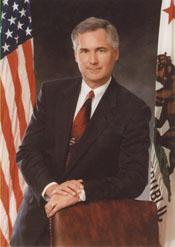2011: Cosponsored legislation to mandate E-Verify (Smith)
Rep. McClintock cosponsored H.R. 2885, the Legal Workforce Act of 2011. This legislation would replace the current I-9 system by making E-Verify (currently the basic pilot federal employment verification program) permanent and mandatory for all employees via a gradual phase-in process. Specifically, an employer with 10,000 or more employees has 6 months to become compliant after the bills enactment, while employers with 500 to 10,000 employees have 12 months, employers with 20 to 500 employees have 18 months, employers with 1 to 20 employees have 24 months, and agriculture service employers have 36 months. It also provides a good faith defense against liability for an employer or recruiter who uses E-Verify and an error occurs.
This legislation stipulates penalties between $250 and $25,000 for non-compliance depending on the size of the company and number of offenses; pattern offenders can then be charged up to $15,000 for each unauthorized alien. In addition, it requires reverification of employees with limited work authorization and allows the Secretary of Homeland Security to debar a repeat offender from federal contracts, grants, and cooperative agreements. Furthermore, it stipulates fines and a criminal penalty, between 1 and 15 years in prison, for an individual who knowingly provides an authorization number belonging to another individual.
Under this legislation, the SSA (Social Security Administration) is required to send out no-match letters to employers if the name and Social Security number of a current employee do not match. The employer is then required to run these employees through E-Verify. The SSA is also required to send a yearly notification to each owner of a Social Security number that has multiple employees reporting use. Moreover, this bill would then establish a voluntary Biometric Employment Eligibility Verification Program (Biometric Pilot) to record and store biometric information making it easier to defend against identity theft.
Finally, while state and local laws relating to employment verification are preempted by this legislation, states and localities may continue to exercise authority over business licensing laws that penalize employers for not being compliant with an employment verification system. Rep. Lamar Smith (R-Texas) is the bills main sponsor.


